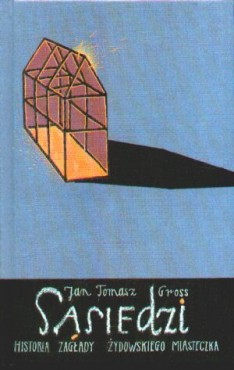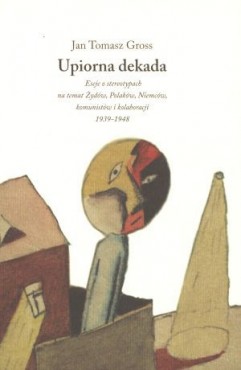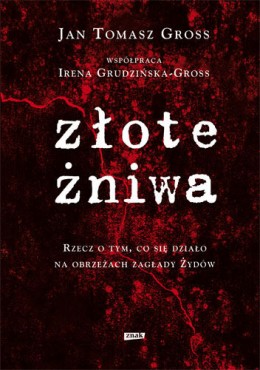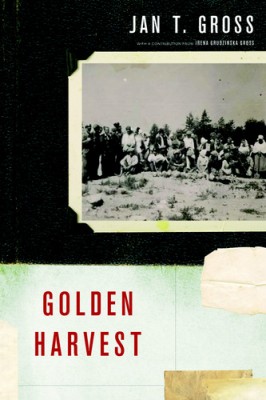JOANNA SZCZĘSNA talks to IRENA GRUDZIŃSKA-GROSS, coauthor of the book Golden Harvest.
JOANNA SZCZĘSNA: Your Golden Harvest coincided almost perfectly with the publication of two other books, by Barbara Engelking and Jan Grabowski, that discuss the same topic: the third phase of the Holocaust, when Jews who had managed to escape ghettos and shipments to death camps sought refuge in the Polish countryside, usually in vain. I get the impression that these titles somehow paved the way for your book, making the facts you present much harder to question.
IRENA GRUDZIŃSKA-GROSS: It’s true, the facts remain pretty much unquestioned. Nevertheless, the issues we write about are so painful that they’re hard to accept, and thus people automatically search for some way to deny them, to push them away, to keep them out of their consciousness – and I don’t just mean people of ill will.
Does that come as a surprise? The very cruelty of the facts is shocking, and you can’t blame people for wanting to somehow save their faith in humanity.
I’m not in the least bit surprised. I had a similar attitude myself for quite a while, even while writing the book, as I kept forgetting what I was writing about. So I understand how readers might feel defensive.
Then there’s the issue of how we write about history. Jan and I asked ourselves whether it was possible to do justice to the subject by writing in a cool, detached manner, turning our gaze away from the blood. And the conclusion we came to was: no, we could not. But please keep in mind that we describe these crimes through quotes, descriptions, and testimonies from eyewitnesses. They’re not our own words.
It would seem that in light of the enormity and cruelty of the murders, the fact that the victims were also robbed shouldn’t be of as great importance. And yet it is, at least in your book, as the title and contents show us.
Jan has already written about Jewish assets, part of Fear was devoted to the issue, and his article for “Tygodnik Powszechny”, “Mrs. Marx’s Pillow”, discussed the subject as well. The problem is a very interesting one. From the very start of the war, the Nazis encouraged the plunder of Jewish property as a way of building a cooperative attitude among the populace all throughout Europe – not just occupied Europe, but also among German allies such as Hungary and Romania.
Irena Grudzińska-Gross
Irena Grudzińska-Gross is an essayist and scholar specialising in European intellectual history and literature. Forced to leave the University of Warsaw during the events of 1968, she continued her studies in romance literature in Italy and the US. She earned her PhD at Columbia University in New York. She has written numerous books, essays, reviews, and articles for such publications as: “Aneks”, “Res Publica”, “The New Yorker”, “Slavic Review”, “La Fiera Letteraria”, “Polish Review”, and “Gazeta Wyborcza”. She teaches at New York University. Having served as Program Officer of the Central and Eastern European programme at the Ford Foundation from 1998 to 2003, she went on to head the Institute for Human Sciences at Boston University from 2003 to 2008. Since then, she has been an Associate Research Scholar at the Department of Slavic Languages and Literatures, Princeton University, and has served as a Visiting Professor at the Polish Academy of Sciences’ Institute of Slavic Studies. In 2007 Irena Grudzińska-Gross published the book Joseph Brodsky, Czesław Miłosz, and the Fellowship of Poets. Together with Jan T. Gross, she published Golden Harvest: Reflections on Events at the Periphery of the Holocaust in March 2011.
She is a contributor to “Biweekly.pl” and “Dwutygodnik.com”.
Did Polish peasants get rich from the plundering?
Polish villages changed completely. Jews, who had previously been a class of traders, were eliminated and their place was taken over by Poles, who regarded it as a step up on the social ladder. The same was true of towns and cities. This gave rise to the middle class that continues to fulfill the role played by ethnic minorities before the war.
But in all honesty, the Jewish property that was plundered during these events, from small things like trousers and shoes to more valuable objects, didn’t make the murderers rich. Some actually consider this to be evidence that the plunder never took place. They go to Treblinka and see how poor the local villages are, and they say “They can’t possibly have dug up any gold. Look how poor they are.” Yet it’s a well documented fact that people dug up valuables in Treblinka, and that the local peasants walked around selling watches out of baskets, like eggs.
Antisemitic propaganda – and the Germans themselves – instilled among the people an image of Jews as bloodsuckers who had grown wealthy on the misfortune of others, parasites who could be robbed with impunity. After all, they were only “stealing what was already stolen”. This antisemitic cliché is exploited to this day: one of the arguments against our book is that the issue of Jewish assets shouldn’t be discussed, lest the Jews show up and demand their property back. It’s not like the peasants didn’t know that they weren’t supposed to murder people. They knew. Just like they knew they were taking the property of others. People are quickly demoralised by easy loot. I’ve heard many times a story about people descending into alcoholism and squandering the wealth they had stolen from the Jews.
When you and Jan made an author appearance at Teatr na Woli in Warsaw, the discussion focused on the question of social norms and practices, and whether these terms could be used in relation to the crimes. I find that while these words don’t provoke any feeling of protest in me, I would say “shamelessness” is a more apt term.
It’s true, these murders were not clandestine, and in fact happened openly, even publicly. People felt no shame about what they were doing.
Although I can’t imagine that anyone would boast about having Jewish property.
But that’s exactly what happened. As far as I remember, in Jedwabne the most prized loot would be brought to the parish priest. So it wasn’t as if they were hiding what they were doing. They knew who was wearing Jewish clothing. It was of much better quality than what these poor people were used to, and quite often they would actually wear the clothing to church.
It started with Neighbors, then there was Fear, and now we have Golden Harvest. Each subsequent volume in this trilogy unveils yet another hard-to-accept truth. Jan Tomasz Gross, Sąsiedzi
Jan Tomasz Gross, Sąsiedzi
(Neighbors), Pogranicze Publishing
House, Sejny 2008The publication of Neighbors was the greatest step forward, as it broke a fundamental taboo by saying Germans weren’t the only ones who murdered Jews during the war – Polish citizens also had blood on their hands. No one had ever talked about that publicly.
Yet this knowledge has been there all along, for example in testimonies given at the Jewish Historical Institute (the Emanuel Ringelblum Jewish Historical Institute in Warsaw – ed.) and in memoirs. It’s just that personal memories haven’t been translated into public memory.
Yes, that’s interesting. People may have heard of individual cases where Poles murdered Jews in hiding, but there’s no conclusion to be drawn from it, no generalisation.
There’s a concept in physics known as “critical mass”. Once critical mass is reached, a chain reaction is started. That’s precisely what happened when the story of Jedwabne finally became a matter of public awareness.
Jedwabne was an example of a mass pogrom without German participation, although it was the Germans, of course, who incited the events. I clearly remember the time I first read a testimony by Szmul Wasersztajn (given to the JHI regarding the murder of Jews in Jedwabne – ed.). I said to Jan, “He’s not a witness, he’s a madman.”
Apparently Gross wanted to include Wasersztajn’s testimony in an earlier book, Nightmarish Decade?
True, but I discouraged it. I read the description of what had happened in that barn in Jedwabne, and I couldn’t believe it, I didn’t understand what I was reading. I said to Janek, “This isn’t a historical document, this man couldn’t have known all of this, this doesn’t sound credible.” And yet Szmula’s testimony was true. That inspired Jan to write Neighbors.
It still happens that I don’t understand certain things. Let me give you an example. There’s a poem by Czesław Miłosz which I’ve read I don’t know how many times, a dozen, tens of times, maybe more. It’s called “A Poor Christian Looks at the Ghetto”. I’ve always interpreted it metaphorically as a poem about the ghetto, about the period following its destruction, when nature did its thing, if you’ll pardon the expression. That’s actually how it starts, with bees and ants. But when I read it a few days ago, I suddenly realised that the first verse simply describes looting.
Hold on, let me find the poem:
Bees build around red liver,
Ants build around black bone.
It has begun: the tearing, the trampling on silks,
It has begun: the breaking of glass, wood, copper, nickel, silver, foam
Of gypsum, iron sheets, violin strings, trumpets, leaves, balls, crystals (…) Jan Tomasz Gross, Upiorna dekada
Jan Tomasz Gross, Upiorna dekada
(Nightmarish Decade). Austeria
Publishing House, Kraków 2007 I had never taken the poem literally. And yet that’s literally what it’s about. I recently talked to Jacek Leociak about it and he said, “It’s all been written, it’s all in the literature.” He’s right, it’s all in the literature, but that doesn’t mean that we understand what we’re reading. It’s all a question of reading, understanding, and assimilating.
Not everyone’s ready for it yet. Even if they don’t deny the facts, they try to neutralise them and convince themselves that it was the doing of a depraved minority. Or they attempt to rationalise it by pointing out the demoralisation brought on by the war, or the cruelty of peasant culture, etc.
You, I, we are the first generation to have grown up in a completely monotheistic and mono-confessional Poland, in a society convinced that Poland reached a crowning moment in its history, a strong, homogeneous country in its right borders. That was one of the reasons why we couldn’t understand what actually happened here under Nazi occupation. The lack of ethnic minorities was something we found completely normal. If that’s your assumption, if you’re willing to accept Poland in such an abnormal state – keep in mind that Poland had never previously been an ethnically homogeneous country – then there are a number of facts that you will fail to comprehend. As a nation, we’re satisfied with how it all worked out. How are we even supposed to consider the balance of grievances? We’re simply unable to accept that Poland, in its current state, is the result of the incredible brutality of war, crimes, and the expulsion of entire groups of people; a state that came at the cost of a horrible amount of victims, among them Polish Jews.
We were the victims, it was we who paid the terrible price, and so we deny anything that might undermine that.
The Germans introduced an identical system in every occupied country, the same system used in concentration camps: the prisoners were to guard each other, with the weak guarding the weaker. It’s true that those Polish peasants and townspeople were victims, but as far as victims went, they were at the top of the hierarchy. So they guarded the weaker victims, not because they had nothing better to do, but because there was pressure to do so. Some of them went about their duties enthusiastically, sparing no cruelty.
Golden Harvest and Jan’s earlier books can be regarded as a counterpoint to the popular narrative about the Righteous. It is said that Poles risked their lives to save Jews. That’s true, but the greatest threat faced by these Righteous Poles were their own neighbors. The books we mentioned earlier, along with other sources, show that the Righteous were few and lived in constant danger.
But there were more than a few: there are a few thousand Polish trees at Yad Vashem.
I’m not saying that their absolute number was small, there simply weren’t many of them compared to the number of vigilant neighbors. I’d like to add that the ones who stood the best chance of surviving were the ones who paid nothing for being hidden, but they were a tiny minority.
I’ve read hundreds of memoirs written by Survivors of the Shoah. And then one day, while reading yet another memoir, it suddenly struck me: I understood which group, in terms of profession, made the greatest contributions to saving the lives of Jews. They were the maids, nannies, governesses, cooks, and household help, the people who had grown close to the families of their employers, whose children they had grown to love.
I know, there’s already someone writing a doctoral dissertation on the subject. Women generally played a greater role than men when it came to saving Jews.
Among the different objections to Golden Harvest…
Those attacks are red herrings, they’re incidental and focus on issues that are secondary to the actual content of our book.
…One grievance is that you compare peasants who murdered Jews for a pair of shoes, some pots, or bedsheets, to Swiss bankers who grew filthy rich on the Holocaust by taking over all the dead bank accounts left unclaimed by heirs, or by rejecting the claims of these heirs. Jan Tomasz Gross. Złote żniwa (Golden
Jan Tomasz Gross. Złote żniwa (Golden
Harvest). Znak Publishing House,
Kraków 2011That’s actually pretty interesting. We’re usually accused of leaving out the context – after all, people would turn in Jews in other countries as well. But when we write about other countries, people still aren’t satisfied. We’re criticized for humiliating barefoot, hungry Polish peasants by comparing them to people who were much worse, people who ate caviar with golden tableware in the peace of their own offices while this was happening.
Damned if you do, damned if you don’t. But as I said, that’s just one of the strategies people employ to protect themselves from this knowledge. Anyway, it’s a marginal issue. What good does it do to compare ourselves – or not compare ourselves – to other nations? Is that supposed to console us? “It’s just human nature.” “It was going on all over Europe.” What kind of consolation is that?
You came to Poland for two weeks to promote Golden Harvest. You had author appearances and interviews with the press, radio, and television. Did you have any notable experiences?
To me, the most precious moments were when I would be talking to someone, and I would see their personal path towards accepting the truth. I talked to people who, since their childhood, had felt that there was some sort of mystery in their village, and who now realized what this mystery was. There were poor families where the grandmother had a single golden earring. I was told a number of different family stories that at first seemed incomprehensible, but later fit together into a cohesive whole.
There’s one more thing that I found very important, but which I still don’t quite know how to interpret. To my surprise, it turned out that readers assume that our book demands an act of some sort: an apology, a confession, retribution. That’s not the case. When writing this book, I didn’t think – we didn’t think – that the public debate here in Poland would take place in religious terms, that it would be a Catholic debate. People mention guilt, even if they deny what we’ve written. That couldn’t be further from the intentions we had when writing this book. It wasn’t about provoking guilt in anyone, about making anyone atone for what happened. The idea was for people to accept the fact that a crime had been committed. Golden Harvest, Oxford University Press,
Golden Harvest, Oxford University Press,
April 2012As a caution and reminder?
Those of us born after the war had no part in the crimes, and we are not the ones to blame. The point is for us to comprehend what happened. Perhaps the reason people keep refusing to accepts these facts is that they take all of it personally, as a kind of accusation?
Don’t you think that Poland is nevertheless exceptional for having faced these horrible facts?
Definitely. No other country has had the kind of debate we’ve seen in Poland. A few things have been published here and there in Western Europe, but there’s been nothing but silence east of Germany. Yet we know that Lithuania, Latvia, and Ukraine saw events perpetrated by the local populace that were no less cruel and terrifying. Perhaps even more so.
translated by Arthur Barys






